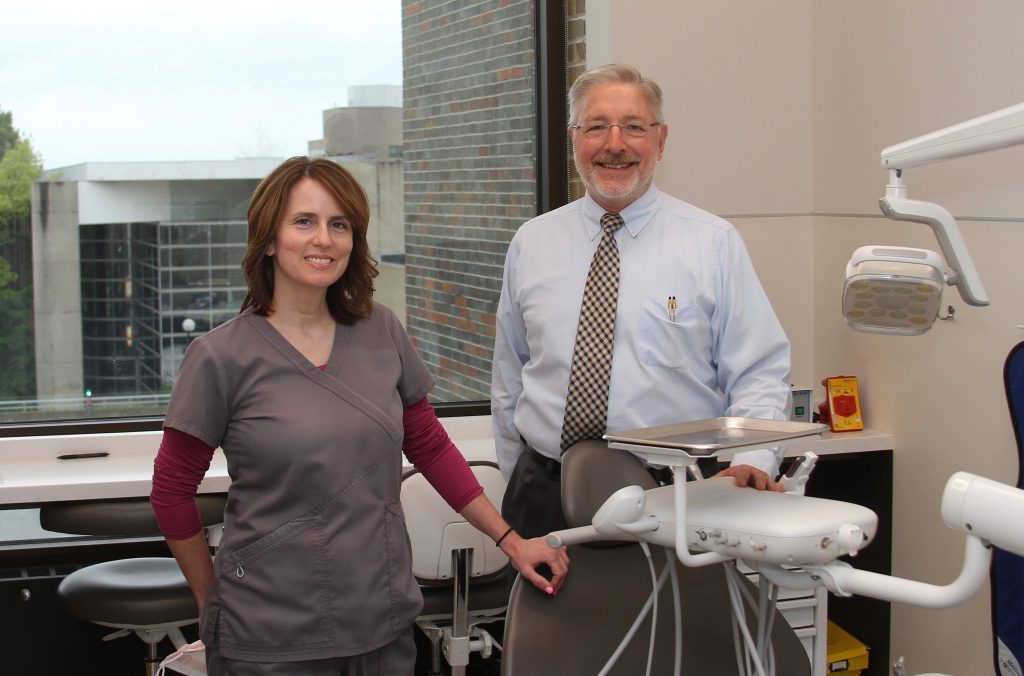Faculty Members Receive Award for Interprofessional Education Project5 min read

Ann Arbor, Mich., June 6, 2022 – Two School of Dentistry faculty members are part of a team that has received a prize for innovative teaching from the University of Michigan Provost’s Office.
The faculty are Dr. Mark Fitzgerald, Associate Dean for Community-Based Collaborative Care and Education and an associate professor in the Department of Cariology, Restorative Sciences and Endodontics, and Dr. Danielle Rulli, a Clinical Associate Professor in the Dental Hygiene program and Director of the Graduate Dental Hygiene Program.
They helped develop a project called LIFE, short for “Longitudinal Interprofessional Family-based Experience,” as part of their work with U-M’s Center for Interprofessional Education.
LIFE is one of five U-M faculty projects involving innovative approaches to improving student learning that received the Provost’s 2022 Teaching Innovative Prize, or TIP, which is also sponsored by the Center for Research on Learning and Teaching and the University Library.
LIFE was developed for students in healthcare fields in collaboration with Michigan Medicine’s Office of Patient Experience. Small groups of students are connected with real patients, referred to as patient advisers, and their families to learn about their interaction with healthcare providers and how chronic illness affects daily life.
Each team of health science students plans how to conduct two interviews with a patient adviser. After each interview, the students debrief what they learned and evaluate how they performed. The patient adviser also assesses the students’ teamwork. Students gain insights from authentic conversations with patients about the time-consuming and emotional work related to chronic illness, including advocating for care, handling complicated insurance issues, managing medications, and completing prescribed daily therapies on top of their work and family roles.
The LIFE program’s materials are shareable with other faculty or institutions wishing to implement this collaborative approach to Interprofessional Education, or IPE.
TIP organizers, in selecting LIFE for one of the awards, said, “Interprofessional education programs provide aspiring health professionals with opportunities to understand each other’s roles and build positive teamwork practices. These exercises, however, can lack authenticity when they rely on one-time case studies or simulations, rather than repeated interactions with real patients and their families.”
Fitzgerald, who has developed and taught IPE courses at the Center for Interprofessional Education for several years, said LIFE started as a small pilot program two years ago and last year grew to about 80 students from across the three U-M campuses. Students were recruited to the elective LIFE project from those who were enrolled in Introduction to IPE, an online course required for students in U-M healthcare programs, including medicine, dentistry, pharmacy, nursing, public health and social work.
Out of the 80 students, groups of 6-7 students were formed so that the composition of each involved various healthcare fields. About a dozen patients were interviewed by the students. The number of both students and patients are expected to grow as the program goes forward.
During the pandemic, the program moved from an in-person project to a virtual platform. Fitzgerald said the online move has proven popular with patients, who reported that they feel less intimidated with online interviews than in-person sessions. The online format also will make it easier for more students to be involved. Fitzgerald said organizers expect the program to grow steadily and could eventually involve hundreds of healthcare students from U-M’s three campuses.
IPE programs like LIFE are important for several reasons, Fitzgerald said. Over the last decade or so, the effectiveness of collaborative healthcare has been shown in many studies, breaking down the barriers that kept various fields in their separate silos. “Interprofessional care is gaining momentum as definitely being part of the future of healthcare, period,” Fitzgerald said. “There is an ever-increasing need to interact with other healthcare providers in order to provide for the oral health and the general health needs of your patients. Our students benefit from programs like LIFE because you need to have at least a working knowledge of the base set of skills you need to work in that sort of collaborative environment.”
Rulli has been active at the Center for Interprofessional Education over the last several years, including as a Fellow in the program in 2018 and as co-director of the introductory IPE course. The LIFE project is an important new offering, she said. “It really brings in some key pieces of healthcare for the students. By interviewing patients, they learn how social determinants cause people to interface with the healthcare system; how those factors affect people’s navigation in the healthcare system; and the importance of an interprofessional team to meet those needs.”
Other faculty on the LIFE team are Olivia Anderson, School of Public Health; Thomas Bishop, Medical School; Debra Mattison, School of Social Work; Laura Smith, Health Sciences, UM-Flint; Karen Farris, College of Pharmacy; and Peggy Ursuy, School of Nursing.
The five projects that won the TIP awards, which come with a $5,000 prize, were chosen from 57 nominations from students, faculty and staff. They fell within one of two focus areas: anti-racist and inclusive teaching, and remote and hybrid teaching developed in response to the pandemic.
###
The University of Michigan School of Dentistry is one of the nation’s leading dental schools engaged in oral health care education, research, patient care and community service. General dental care clinics and specialty clinics providing advanced treatment enable the school to offer dental services and programs to patients throughout Michigan. Classroom and clinic instruction prepare future dentists, dental specialists and dental hygienists for practice in private offices, hospitals, academia and public agencies. Research seeks to discover and apply new knowledge that can help patients worldwide. For more information about the School of Dentistry, visit us on the Web at: www.dent.umich.edu. Contact: Lynn Monson, associate director of communications, at [email protected], or (734) 615-1971.
